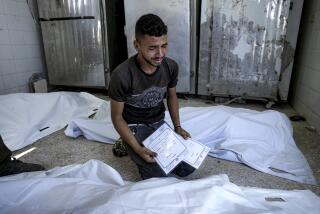Israeli security Cabinet meets to reconsider metal detectors at sacred Jerusalem plaza
- Share via
Reporting from Modiin, Israel — Prime Minister Benjamin Netanyahu huddled with Cabinet ministers Sunday to reconsider the placement of metal detectors at the entrance to a sacred Jerusalem plaza, which touched off a wave of deadly Palestinian unrest and a diplomatic crisis for Israel.
Palestinian leaders and Israel’s Arab neighbors have assailed the additional security measures — instituted a week ago after three Arab gunmen ambushed and killed two Israeli Druze policemen at the entrance to the esplanade outside Al Aqsa Mosque — as a unilateral move to tighten control over the site, which is holy to both Muslims and Jews.
Netanyahu’s government has also come under fire from some Israeli officials who warn that the risk of a religious conflict triggered by the metal detectors overshadows the extra security they provide.
Three Palestinians were shot dead Friday in clashes with Israeli police in East Jerusalem. That night, three Israelis were stabbed to death in the West Bank settlement of Halamish by a 19-year-old Palestinian from a neighboring village.
On Sunday, Palestinian Authority President Mahmoud Abbas said his decision to freeze ties with Israel over the bloodshed includes security cooperation with Israel — a collaboration that has been a bulwark of stability in the West Bank for years.
Despite quiet talks between Israel and Jordan, the custodian of the Muslim holy sites in Jerusalem, to defuse the crisis, there were indications Sunday that the violence might have spilled over to the neighboring kingdom. Media reports in Jordan said two local nationals were killed and an Israeli citizen was wounded in gunfire inside the Israeli Embassy compound in Amman, Jordan’s capital.
Preliminary investigations indicated that the two Jordanians had entered the compound to do carpentry work, the country’s official Petra news agency said, citing the Public Security Directorate. There was no immediate comment from Israel, which declared a news blackout on the incident.
The United Nations Security Council is scheduled to discuss ways to defuse the crisis in Israel on Monday.
Israel’s public security minister, Gilad Erdan, said Sunday that the metal detectors could be removed if police come up with another way to ensure security at the site. But he told Channel 2 TV he is “not aware of such a program.”
Netanyahu has been under pressure from members of his right-wing coalition not to bow to calls to remove the metal detectors.
Speakers at the packed funeral for the three Israelis killed Friday — Yosef Salomon, 70; his daughter Chaya Salomon, 46; and son Elad Salomon, 35 — also urged the government to hold firm against Palestinian demands and tighten control over the West Bank, which Palestinians claim for a future state.
“It’s time to cut down the hope of the Arabs for a state in the land of Israel and to impose sovereignty in all of Judea and Samaria,” said Rafi Mendel, an in-law who referred to the West Bank by its biblical names.
Others called on the government to step up settlement building as “revenge” for the killings, saying the young assailant, Omar Abed, should have been killed rather than taken to a hospital after he was shot by an off-duty soldier who heard the family’s screams.
Hours before the attack, Abed posted a farewell note on Facebook accusing Israel of “desecrating” the Muslim holy sites and vowing to “answer the call of Al Aqsa” with a knife.
“The Arabs are guests here. If they don’t act properly, they need to leave,’’ said Yifat Rosenheim, who said Chaya Salomon taught her kids when they were in elementary school.
Other family friends, however, said the aggressive rhetoric was not in keeping with the family’s gentle reputation. A former neighbor, Yossi Shinover, remembered Yosef Salomon, a volunteer guard at the settlement, as someone who welcomed Palestinian laborers to Halamish with water, empathy and a smile.
Asked about the crisis over the Jerusalem holy sites, Shinover shrugged.
“Both sides are dreaming,” she said. “And then there’s the need to be practical. That’s the problem.”
Mitnick is a special correspondent. The Associated Press contributed to this report.
Twitter: @joshmitnick
More to Read
Sign up for Essential California
The most important California stories and recommendations in your inbox every morning.
You may occasionally receive promotional content from the Los Angeles Times.













